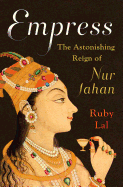
Ruby Lal's biography, Empress, sheds new light on Nur Jahan, who, in the early 17th century, became the only female co-sovereign in the history of the Mughal Empire. According to Lal (Coming of Age in Nineteenth-Century India), "It would be another 350 years, when Indira Gandhi became India's first female prime minister, before another woman ascended to such heights in Indian statecraft."
Nur Jahan is a well-known figure in South Asia, the subject of "at least eight movies, several plays, an opera, and numerous historical romances." As a result, much of the book involves separating popular legends of Nur from the real-life person. While recognizing the appeal of these stories, Lal seeks to humanize the empress and focus less on the royal romance than her achievements as a ruler.
As a co-sovereign, Nur issued currency, designed buildings, issued "important orders under her own signature" and protected peasants from "harassment and overtaxation." In a particularly cinematic episode, Nur also led rescue attempts that saved her husband, the Emperor Jahangir, after he was kidnapped.
Empress succeeds in its mission to impress upon the reader the remarkable character and achievements of Nur Jahan. Nur eventually lost power after Jahangir's death, but her ability to navigate treacherous Mughal politics for so long and come out alive is its own accomplishment. According to Lal, Nur has been unfairly blamed for the civil strife that accompanied the latter part of her rule with Jahangir and given little of the credit she deserves. Empress remedies these slanders and oversights while telling an engrossing tale of female power. --Hank Stephenson, bookseller, Flyleaf Books, Chapel Hill, N.C.

